The government has been accused of cynically releasing a report that says several billion barrels of oil reserves are under large swaths of southern England a day after the European and local elections in order to bury controversial news.
The long-awaited report by the British Geological Survey (BGS) concludes that "a reasonable central estimate for shale oil is 4.4bn barrels in the ground" in the Weald basin – an area which lies under Kent, Sussex, Surrey and Hampshire. The top estimate is 8.5bn barrels of oil.
But the report concludes there is "unlikely to be any shale gas potential" under the region because the oil reserves are not definitely recoverable.
The report is likely to cause alarm in Tory heartlands. The chancellor George Osborne's father-in-law, Lord Howell, has said fracking should not take place in the south and would lead to the loss of thousands of Tory votes. The Weald basin includes the South Downs national park and several areas of outstanding national beauty.
In an attempt to counter such concerns the government has also set out additional compensation for communities affected by the controversial technique. It has proposed a voluntary "community payment of £20,000 per lateral well" in order to "simplify deep underground access for shale gas and geothermal industries".
The government also wants to speed up shale companies' ability to get access to land. The current process is "time-consuming, uncertain and costly". It says: "If we did nothing to address this issue, the commercial exploitation of shale gas and oil in Great Britain is unlikely to develop in a timely manner, or at all."
The energy minister Michael Fallon denied he was disappointed that the BGS report said there was no shale gas in the Weald. "It is not a let-down or a let-up … I am not disappointed or happy. It is what it is."
Asked if shale had been overhyped, he said: "Not by the government."
Labour and environment campaigners the accused the government of trying to bury controversial news.
The shadow energy minister Tom Greatrex told the Telegraph: "The timing of these announcements will strike many people as cynically and deliberately driven for a day when focus will be on election performance, and ahead of the count of the European elections."
Friends of the Earth agreed. Its south-east England campaigner Brenda Pollack said: "These latest estimates will set alarm bells ringing across the south-east of England where fracking firms seem intent on punching holes in some of Britain's most beautiful countryside in the search for profits.
"No wonder the government waited until after the elections to make this announcement as Lord Howell recently warned that fracking will cost the Tories thousands of votes in their heartlands.
"Shale oil and gas are not the solution to the UK's energy challenges. Rather than drilling for more dirty fossil fuels that will add to climate change, the government should be backing renewable power and energy efficiency."
The BGS has already found large reserves of shale gas in the north and has now completed a months-long survey of the extent of it in the south.
Previous similar reports in the US have had to be revised considerably after further exploration and analysis. Previous estimates of recoverable oil in the Monterey shale reserves in California of about 15.4bn barrels, for example, have turned out to be overstated. A revised estimate from the US Energy Information Administration cut the figure by 96% to 600m barrels of oil.
Alongside the report, the Department of Energy and Climate Change will announce a new payment of about £20,000 for each lateral well at fracking sites. The average site will have 10 wells, each with four lateral wells, making the average total £800,000. The payments are on top of the existing compensation system, under which communities are to be given a lump sum of £100,000 when a test well is fracked, plus 1% of revenues.
David Cameron, who is due to announce the new compensation package, has insisted fracking will be "good for our country" and has blamed a lack of understanding of the process for some of the opposition. Ministers claim the process could bring down energy bills and create thousands of jobs. Environmental activists are bitterly opposed to the technique, which they say can cause small earthquakes and pollute water supplies. They also argue that it is wrong to exploit new fossil fuel reserves when scientists say that existing conventional reserves are more than can be burned without risking dangerous climate change.
The government is also preparing to introduce changes to the trespass laws that would make it easier to begin fracking.
The Green party MP, Caroline Lucas, said fracking would not bring down energy bills as the gas or oil exploited would be sold on European markets and not used in the UK.
She told BBC2's Newsnight: "Even the boss of [the fracking firm] Cuadrilla has said fracking in Britain would not reduce energy prices. [The economist] Lord Stern has called it baseless economics and that's because here in the UK if we frack in the UK we don't actually use that gas or oil in the UK. It gets sold on European markets at the going price.
"That's very different from the States where because it's a much bigger country and they are less locked into those bigger world markets they use their own gas and oil as they frack.
"Even the experts, even the people who are in the forefront of the fracking ideology are saying actually that it's not going to lead to lower prices, so if you want lower prices you need to go down the renewable route."
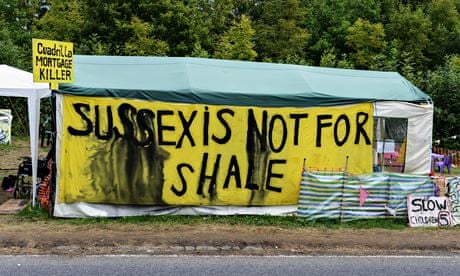
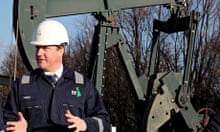
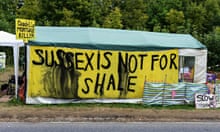

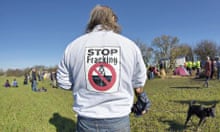
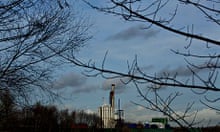
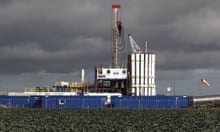

Comments (…)
Sign in or create your Guardian account to join the discussion